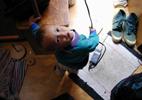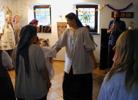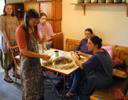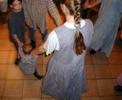
| [Homeless] | [EvoluLog] | [LiBaware] | [Search] | [GuestBook] |

Ever heard of the Twelve Tribes? We were personally invited to visit them back in Barcelona by two nice "brothers" from the Spanish community who treated us with their delicious dry-fruit cake. We heard how serious and devoted these people are and the place was right on our way to the communities in the north. So we made an exception this time and visited a religious community. (We usually skip the religious ones - we seculars are raised to see religious people as fanatic preachers and leeches, who bomb themselves with so-called innocent people). We are members of a new society. It is a different kind of society, one in which no one is despised or unimportant, no one lonely or unwanted. The strong are not exalted and the weak are not exploited. There are no rich or poor. Love lives here.
This is a society of an entirely different order. It is a new social order. The peace that reigns in our midst is not due to laws and law enforcement. We do not do things out of obligation, but because we choose to. In this life of love, no one has a right to be cold to his neighbor. Malice, put-downs, and paybacks are foreign to our way of life. Love restrains us from striving to get ahead of each other, from taking advantage of one another, from turning our backs on one another when times get hard. Everyone knows what the old social order is like. Each person is responsible for his own life and the lives of his family, if he has one. Once people have food, clothing, and shelter, they may try to be kind to their fellow human beings. But there is a limit and there are barriers - racial, religious, economic. No matter how many laws are passed, the walls between people still remain. Even within the same family there are barriers. One brother has his set of friends, the other has a different set, the sister has still another, and they can't even sit down and have a meal together Most social barriers are like weeds. They have deep roots. No matter what you do to cut them off at the surface, they keep springing back up. The new society we live in is not this way. We have been given a radical solution that enables us to love. The chains of fear and guilt that hold mankind in bondage have been broken for us. Who can love when the barrier of guilt rises up? It is the painful weight, the sudden memory that comes when you are with someone you have hurt, or someone who has hurt you. Who can give when they are afraid of losing their possessions, their time, even their own life? This is how the Twelve Tribes present themselves in one of their many Free Press papers. They reach out to people this way and in other unconventional ways such as backpacker messengers, welcoming mobile gospel buses in Grateful Dead concerts, and by letting people pick them up hitchhiking.
Every morning we were woken up by someone singing near our window at 6:15. We would all still be sleeping this early, but one of us would attend the first minkha at 7:00. (Wednesday starts at 6:00, sacrificing one hour of sleep for a special Bible revelation and interpretation meeting.) The minkha Following the minkha the women had a short meeting to make sure all of the household duties were taken care of for the day and then everyone would eat. Breakfast was always a hearty meal of cooked vegetables, millet, and often tofu. Once a week was muesli (oats with nuts and raisins).
Doing the dishes was a social and enjoyable event. In the kitchen they set up a table with three containers of hot water (soapy, less soapy, and clean) and drying racks with towels. Everyone could stand around the table and do their dishes together while chatting and telling kosher riddles and jokes. There were always at least four people there and everyone (toddlers included) was involved with a smile. In the afternoon there was more housework and also making things like pickles, lots and lots of pickles, making tofu, and doing laundry. (The three washing machines were literally on from morning until midnight.) Around 18:00 the men would start coming home and most families would eat, and then everyone would meet for another minkha at 19:00 with more singing and dancing to music and reflections on the day that passed. The radical liberal meets the radical conservative in many levels... This is because they are both more self-responsible, making the government useless and unnecessary. The babies are all home-birthed with one or more of the female members acting as midwives. They are cloth-diapered, not vaccinated, naturally medicated, and breastfed until at least 3 if possible. They stay with their mothers until they are 4. They are trained from a very early age that children must obey their parents. They are by their parents side almost at all times (besides when in training) until they are 13 or so. They come to expect that if they disobey their parents, they will be DISCIPLINED. As a rule they do not raise their voice at their children, however there is physical punishment. The response to our opposition of spanking was that a child knows what is right and what is wrong and when they do something that goes against their conscience (i.e. disobey) they feel guilt and by getting a flexible bamboo rod to their buttocks it frees them of this guilt. Otherwise this guilt builds up inside and leads to feelings of self-loathing and shows through worse behavior in the future.  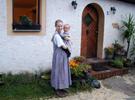  We decided that we are fully responsible for Momo's behavior, and therefore it is only fair that we and not her would be punished if any discipline problems arise. So we got her her own bamboo rod and hopefully she will have mercy on us when we are disobedient. The children are all trained together according to their ages and are basically taught German, religion, mathematics, singing, and physical education. When they get to the important age of 13, they start doing part-time apprentices, like producing clothing, embroidery, cooking, and midwifery for the girls, and construction and gardening for the boys, usually with the respective parent. The also may learn a musical instrument.   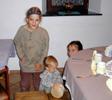 Apart from their training they don't seem to have much time. They are never just sitting around. They are always helping their families with all of the daily chores or doing their homework. On occasion, you can find them playing a small game of volleyball (they are just starting to reintroduce this after deciding it took too much of their time in the past) or a game of 'Memory.' They don't grow up with any toys (besides maybe some blocks). Their readings and music all come from inside the community, and even picture books teaching shapes and colors are censored from pictures such as clowns (silliness), and magic wands (fantasy), and diamond rings (materialism).    Virtually the parents have full control over the children (while other parents let anybody else do the job - corporate TV, the mall, mediocre school). There's no such thing as boredom here and the children were some of the most happiest children we've seen, always smiling and laughing and happy with just simple pleasures. OfeK was constantly asked for meaning of names (all in Hebrew) by the children (and sometimes adults). He would reply with the modern and plain meaning, far from the metaphorical and spiritual meaning they had in mind. We were there for the special occasion of the dedication of a baby girl. This happens when the baby girl is 80 days old (40 for boys), and it is here that the name of the child is revealed to all. She was named Hanah Nedava Yedidut (Grace Generous Friendship). The name is very significant and it is what the parents want their child to grow into. Birthdays are handled in an intriguing custom. First, they are not a big deal, and second, the only gifts are the ones the child makes for the parents (a song, a handmade piece of clothing). On the other hand the child receives gifts from the parents on regular days throughout the year. The diet is a mix of western health food, kosher principles, and bits of ethnicity (chopsticks) from the countries where one of their tribes exist, with lots of sea-salt (salted once more at the table). All the vegetables were from the garden, they grew dinkel (spelt), and they had goats for the little dairy they consumed (they are trying to phase out all other dairy), and chickens for their eggs. The only non-organic food they bought was the fruit they got wholesale in an after-the-market deal. There was a regular column in the Inter-Tribal Newsletter they got every month dealing with nutrition, and because of this, every community seemed to end up eating very similarly. Millet was considered very healthy, so we ate that a lot, and a usual hot drink was Mateh (tea from Argentina). 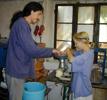 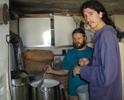     Preparing 12 kilos of tofu for the week
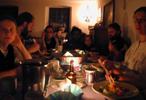 The community keeps the Shabat. Every Friday is called Preparation Day. At the end of the morning minkha they would make sure that everyone knew their job for the day and that everything was covered (they would skip breakfast and then eat only fruit for lunch) and then everyone would quickly get to work cleaning and preparing for Shabbat. Each family had a different responsibility each week in addition to housecleaning. There were four main jobs - preparing the hors d'oeuvres for that evening, preparing the Special Meal, preparing the Shabat Pie for breakfast, and preparing the lunch The community keeps the Shabat. Every Friday is called Preparation Day. At the end of the morning minkha they would make sure that everyone knew their job for the day and that everything was covered (they would skip breakfast and then eat only fruit for lunch) and then everyone would quickly get to work cleaning and preparing for Shabbat. Each family had a different responsibility each week in addition to housecleaning. There were four main jobs - preparing the hors d'oeuvres for that evening, preparing the Special Meal, preparing the Shabat Pie for breakfast, and preparing the lunch 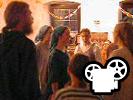 for the next day. In the early evening around 16:00 all work would stop and everyone would get dressed up for Shabat. Community members from the new community site would come and join in for the special occasion. The night's minkha would have even more singing and dancing then usual and people were extra happy. While waiting for for the next day. In the early evening around 16:00 all work would stop and everyone would get dressed up for Shabat. Community members from the new community site would come and join in for the special occasion. The night's minkha would have even more singing and dancing then usual and people were extra happy. While waiting for 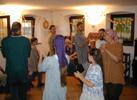 the minkha to start the children of the family who were in charge of the hors d'oeuvres would make rounds around the room pouring tea and passing them out. Then after the minkha everyone would move into the dining room where the tables would be set up with candles and nice tablecloths, etc. This time the family in charge of the Special Meal would serve the three-course meal like in a restaurant, coming back to ask if you would like seconds, and not eating until everyone was finished. the minkha to start the children of the family who were in charge of the hors d'oeuvres would make rounds around the room pouring tea and passing them out. Then after the minkha everyone would move into the dining room where the tables would be set up with candles and nice tablecloths, etc. This time the family in charge of the Special Meal would serve the three-course meal like in a restaurant, coming back to ask if you would like seconds, and not eating until everyone was finished.
Their way of coming together into marriage is quite special. First, they are not allowed to openly show that they are interested in someone. They would just hope that God would turn the other's heart towards them. When feelings would get a bit stronger, one of them would tell a parent or elder, who would decide if it was an appropriate match, and then if both parties were in agreement, an announcement would be made of an engagement. This period would last at least six months, and in this time the couple was allowed to spend time together and even go as far as holding hands. Also in this period, either party could back out at any time. Then eventually, if they decide to marry a date would be set, and preparations would begin for this major event. The wedding ceremony is like a big dramatic play symbolic of man's marriage to God. The bride and groom spend the week before separated and only during the ceremony when he calls his bride's name does she come running out and they are finally together for eternity. We saw pictures of one wedding with 400 guests and it is truly a very beautiful fairy-tale event. Divorce is obviously non-existent but if one of the partners leave the community, the one who stays is allowed to remarry. Another aspect is that the wife must obey, or submit to or complete her husband. One article we read about this said that it is when the wife chooses to "argue and bicker" with her husband the whole family structure breaks down and the children don't see respect between the parents so they don't respect their parents as well. Our two weeks with this community was like spending two months at any other community. It felt so intensive because of the constant activity and because of the constant occupation with 'the meaning of life' and what is really reality. It was easy to fall into the idea that this was the real world. In this time we learned a lot, like how 40 people can make it with one shower when the other one is broken. We saw how hard these people work to truly love each other and hold no 'bad' thoughts inside.
There's so much more to elaborate, but maybe it's better for our curious reader to see for herself or himself and visit their community or their website at www.twelvetribes.com. They are all over the world and they are open for all. In the meantime, here's some more pictures of Momo, and of her friend Emily.  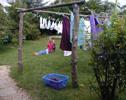    |
||||
 We are learning a new way of relating to other human beings - without fear, without hostility, without suspicion. We are becoming like little children. We live in an atmosphere of trust. Love rules here.
We are learning a new way of relating to other human beings - without fear, without hostility, without suspicion. We are becoming like little children. We live in an atmosphere of trust. Love rules here.